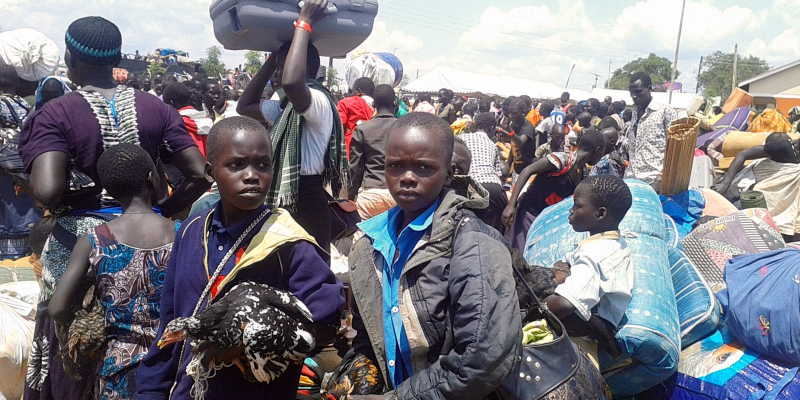News
South Sudan refugees overwhelm aid providers
Accepting refugees is motivated by the spirit of unity and pan-Africanism – Museveni

Thousands of South Sudanese refugees have crossed into Uganda and are being taken care of by UNHCR and other agencies. PHOTO courtesy of IRIN
The number of people seeking refuge in Uganda from South Sudan has overwhelmed agencies and individuals stationed at different reception centres located near the Uganda-South Sudan border.
Reports from humanitarian agencies as well as individuals currently involved with receiving refugees reveal that the camps are overflowing with needy and emotionally traumatised people majority of whom have escaped the fighting in South Sudan.
By Thursday this week, 37,491 refugees fleeing fighting in South Sudan had been registered into different camps in Uganda near the South Sudan border, according to Adrian Edwards, the Spokesperson United Nations High Commission for Refugees (UNHCR).
The rate of new arrivals, as shown by the fact that Uganda has received more refugees in the past three weeks compared to the previous six months, has exceeded the capacity of the facilities and agencies to cope.
Sylvia Nabanoba, the Communications Officer at Save the Children Uganda, says she was overwhelmed by the sheer number of people who were trying to cross the gates into Elegu Rufugee Collection Point at the border with South Sudan in Adjumani.
In an emotional post on her Facebook page, Nabanoba said: “I spent the whole of last week covering the South Sudan refugees arriving in Uganda for Save the Children Uganda. One day Elegu Refugee Collection Point had a few hundred people, the next day it was overflowing with thousands. To the extent that at one point the gate had to be closed so that the thousands inside could first be relocated to Nyumanzi reception centre before the hundreds waiting outside could be let in.
Nabanoba says the sheer number of people in need of urgent help, as well as the psychological state of some of the refugees left her equally traumatised.
“Watching the mothers with babies strapped on their backs, heavy loads on their heads, several little ones running behind, I tried to place myself in their shoes. I already knew which of mine would be strapped on my back if the tables were turned. Seeing a blind man led by a boy barely three years old, elderly people sitting in the scorching heat mumbling to themselves, children wailing before their helpless mothers – I would look away so they didn’t see the tears in my eyes,” says Nabanoba.
The high number of refugees has severely stretched the resources and capacity of refugee collection points, transit centres and reception centres, according to Edwards.
Edwards points out that at one point in recent days, Elegu was holding 11,000 refugees ten times above its capacity of 1000 refugees.
Besides the congestion, which is being addressed by relocating some of the refugees to new camps in Yumbe and Adjumani districts, Edwards points out that humanitarian agencies are facing serious resource constraints to take care of the high number of refugees.
“The humanitarian response to the influx of South Sudanese refugees is sorely lacking due to severe underfunding. The inter-agency appeal is only funded at 17 per cent, which is constraining UNHCR and its partners to provide emergency and life-saving activities only and causing limitations to the full breadth of humanitarian assistance that can be offered,”
According to the latest UNHCR Revised Regional Refugee Response Plan, about US$200m is needed to take care of both the old and new refugees from South Sudan.
The latest wave of refugees was triggered by fighting between soldiers loyal to President Salva Kiir and his vice Riek Machar. Although fighting has since stopped, UNHCR says that refugees are reporting violence, looting and forceful conscription of men in the villages of South Sudan to join the fighting.
Uganda not about to shut doors to refugees
While addressing a meeting of ministers and other senior government officials in Kyankwanzi this week, President Yoweri Museveni reaffirmed Uganda’s readiness to host more refugees.
President Museveni said: “Accepting African refugees is part of the solidarity with our African brothers and sisters. However, it is also a component of our Pan-Africanist strategy to work for the unity of Africa in order to ensure our prosperity and the prosperity of our African brothers and sisters.”
Museveni’s comments and indeed Uganda’s position towards foreigners is in sharp contrast to sentiments towards refugees or migrants in several other countries of the world. Great Britain that recently voted to leave the EU primarily because of fears regarding migrants.
Uganda recently earned the praise of the UN refugee agency as being the most welcoming country to refugees in the entire great lakes region.
According to UNHCR, Uganda currently hosts over half a million refugees.
The composition of the people was a wake-up call for me. The poor and well-to-do, educated and uneducated were all together, in this one place, suffering the same plight. The comfort of their homes forgotten, their lives put on hold. A young man carrying his daughter said, “We don’t deserve this.” They certainly don’t, and no human being does. But war affects everyone. Let’s pray for South Sudan
Comments


















